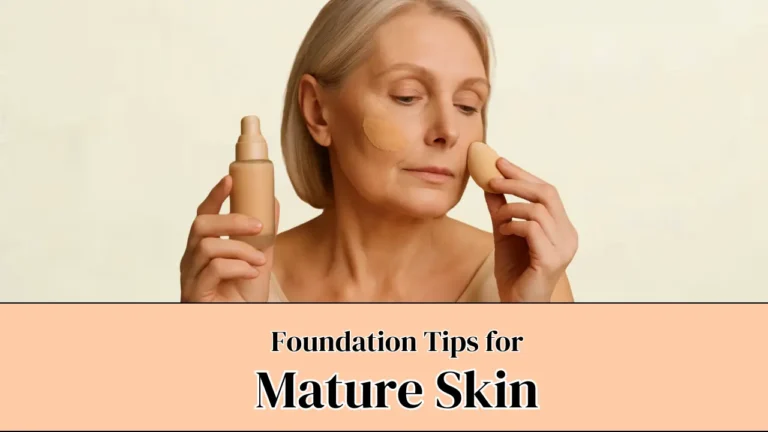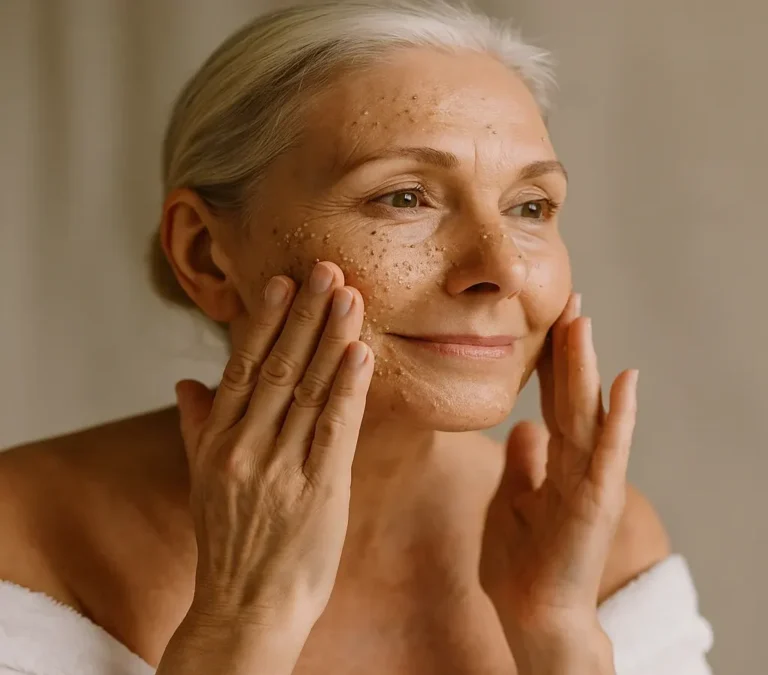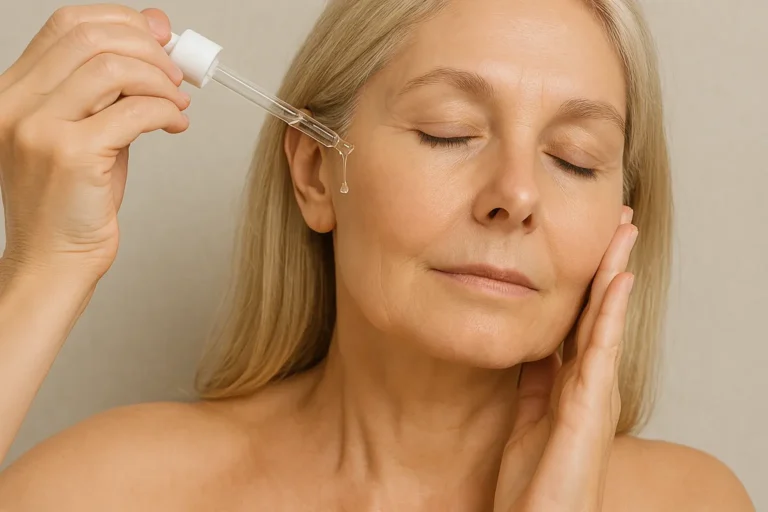The Benefits of Vitamin C for Aging Skin: A Complete Guide-2025
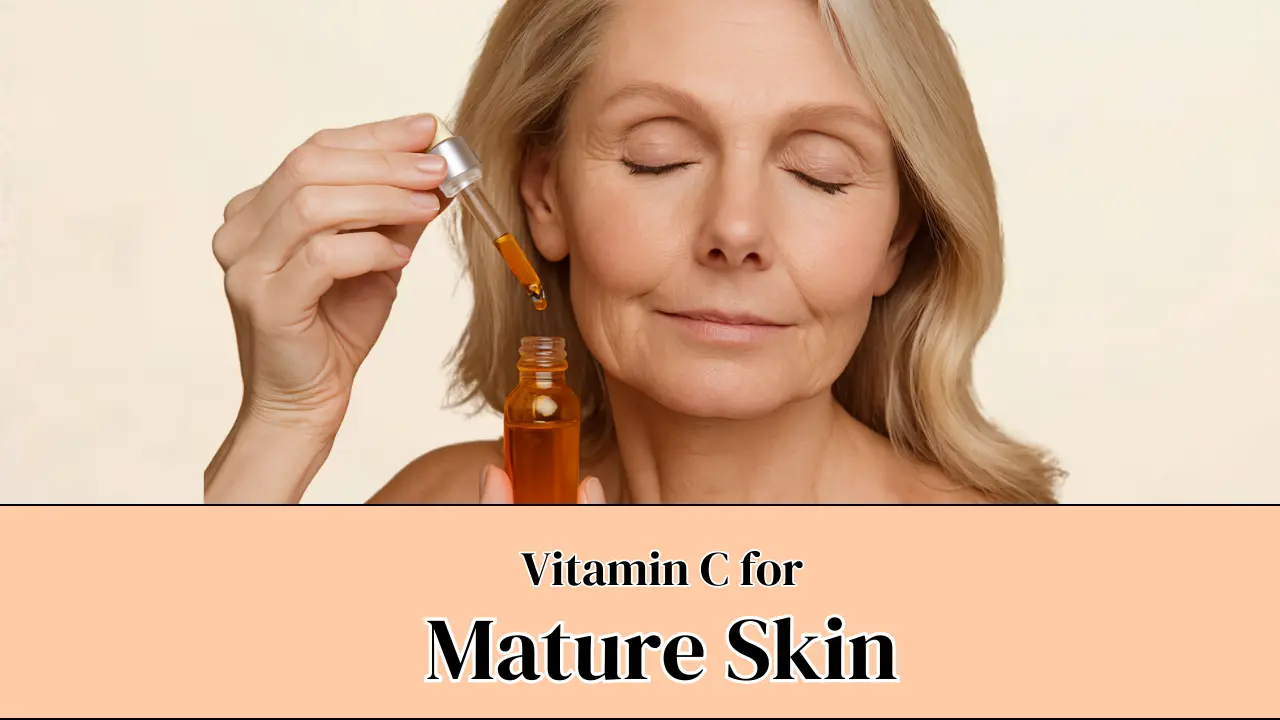
As women grow older, their skin goes through some significant changes. The production of collagen starts to slow down, elasticity fades, and those pesky wrinkles, fine lines, and age spots become more noticeable. Things like sun exposure, hormonal shifts, oxidative stress, and pollution can speed up the aging process even more. Among the many anti-aging products out there, vitamin C has really stood out as a key ingredient with incredible potential for aging skin.
In this detailed guide, we’ll look at how vitamin C for aging skin can rejuvenate mature complexions, bring back that lost glow, and provide ongoing protection against further damage. Aimed specifically at mature women, we’ll explore the biological changes that come with aging skin, the unique benefits of vitamin C in counteracting these effects, and practical tips for incorporating it into your skincare routine and daily life for healthier, more radiant skin.
Understanding Skin Aging in Women
Collagen Breakdown
Collagen is the key protein that keeps our skin looking firm and structured. Once women hit the age of 25, they begin to lose about 1% of their collagen each year. After menopause or over 50, this loss speeds up because of hormonal changes, which can lead to sagging skin and fine lines.
Reduced Skin Elasticity
Elastin fibers are what give our skin that lovely bounce, but unfortunately, they start to break down as we age. When this elasticity fades, our skin can start to sag and show deeper wrinkles.
Thinning and Dryness
As we age, our skin tends to produce fewer natural oils and lipids, which can lead to it becoming thinner, drier, and more delicate. This change often results in a crepey appearance, especially around sensitive areas like the eyes, mouth, and neck.
Hyperpigmentation
Sun exposure, hormonal changes, and inflammation can all contribute to an uneven skin tone, leading to dark spots and blotchiness. As our skin ages, these discolorations often become more noticeable, giving the complexion a dull and aged appearance.
Slower Cellular Turnover
The natural renewal cycle of the skin slows down dramatically, causing a buildup of dead cells, dullness, and rough texture.
Understanding these fundamental changes is critical to recognizing why vitamin C is so beneficial for aging skin.
The Science Behind Vitamin C and Aging Skin
Vitamin C (ascorbic acid) is a water-soluble antioxidant vital for skin health. It plays multiple roles that are especially beneficial for mature skin:
- Collagen Production: Vitamin C is essential for the hydroxylation of proline and lysine, amino acids necessary for stabilizing and cross-linking collagen molecules.
- Neutralizing Free Radicals: It protects skin from oxidative stress caused by UV rays and pollution, preventing premature aging.
- Inhibiting Melanin Synthesis: Vitamin C suppresses the enzyme tyrosinase, reducing pigmentation and brightening the skin.
- Anti-inflammatory Effects: It calms inflamed, irritated, or stressed skin, common concerns in aging women.
How Vitamin C Revitalizes Aging Skin
Rebuilding Collagen Networks
Vitamin C gives a boost to fibroblast cells, prompting them to create new collagen fibers. This process helps to rebuild the skin’s natural support system, bringing back lost volume and firmness. As a result, mature skin appears fuller, with fewer hollows and sagging spots. The overall facial structure looks more lifted and youthful.

Smoothing Wrinkles and Fine Lines
Vitamin C is a powerhouse when it comes to boosting collagen and elastin, giving your skin that smooth, polished look. It works wonders on those fine lines that often show up around the eyes and mouth, making them less noticeable. With regular use, wrinkles seem to fade, and your skin takes on a softer, more refined glow. Stick with it, and you’ll gradually see a more even and radiant complexion.
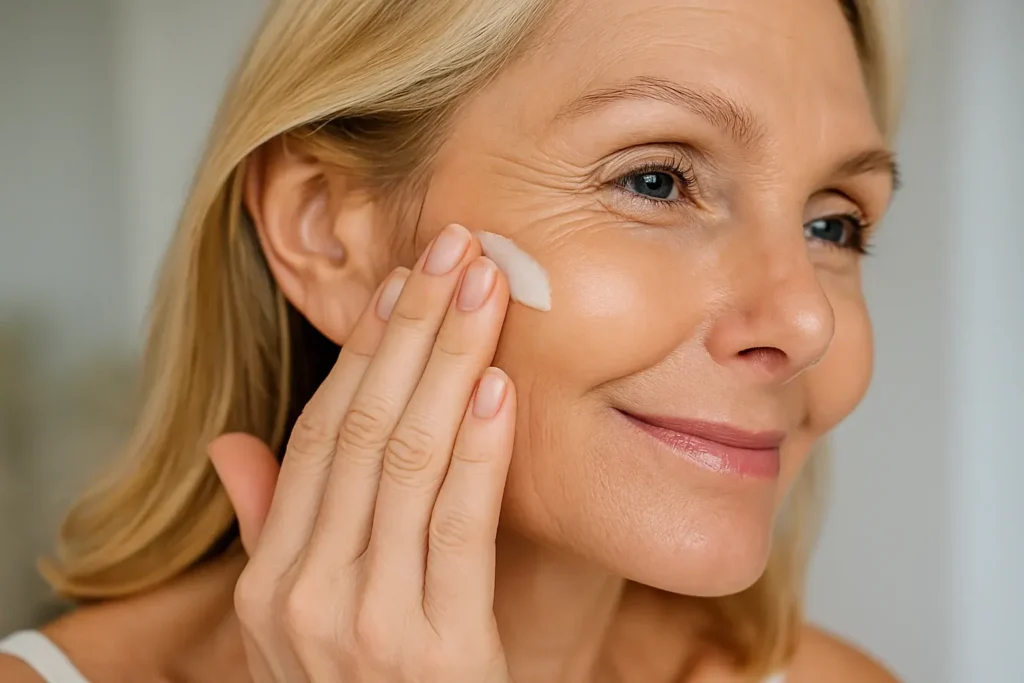
Restoring Elasticity
Vitamin C for aging skin works wonders by rejuvenating those tired elastin fibers, making your skin more resilient and bouncy. You’ll notice that sagging around the jawline, cheeks, and neck starts to fade away. Your skin will feel firmer and look noticeably tighter, giving you a beautifully sculpted and defined facial contour.
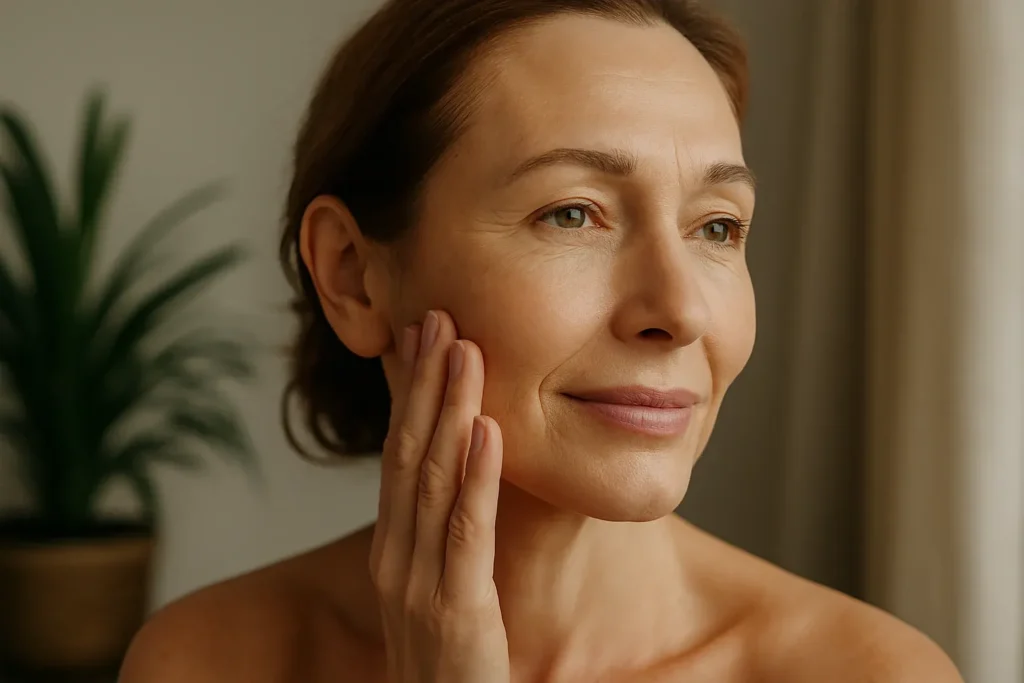
Brightening Dull, Uneven Skin
Vitamin C works wonders by slowing down melanin production, helping to fade dark spots, sun damage, and discoloration. With regular use, it can really brighten up your complexion, giving it that radiant glow we all desire. For those with mature skin, it helps restore a healthy, youthful appearance, replacing any tired, dull tones. Plus, those uneven patches start to smooth out, leading to a beautifully flawless finish.
Strengthening the Skin Barrier
Vitamin C is like a superhero for aging skin, boosting its natural defenses and helping to lock in moisture while reducing sensitivity. It’s especially great for aging skin, as it helps keep hydration levels up, making your skin feel softer and more resilient. Plus, a stronger barrier means better protection against pollution, UV rays, and everyday stressors. With Vitamin C, your skin can stay plump, nourished, and looking visibly healthier.
Accelerating Wound Healing
As our skin gets older, it tends to heal more slowly. But here’s where vitamin C comes in—it really helps speed up the healing process for cuts, surgical scars, and those tiny tears in the skin by boosting collagen and tissue formation. This means you can expect a smoother healing journey with fewer marks or discolorations. Ultimately, it gives your skin a fresh, revitalized look and feel.
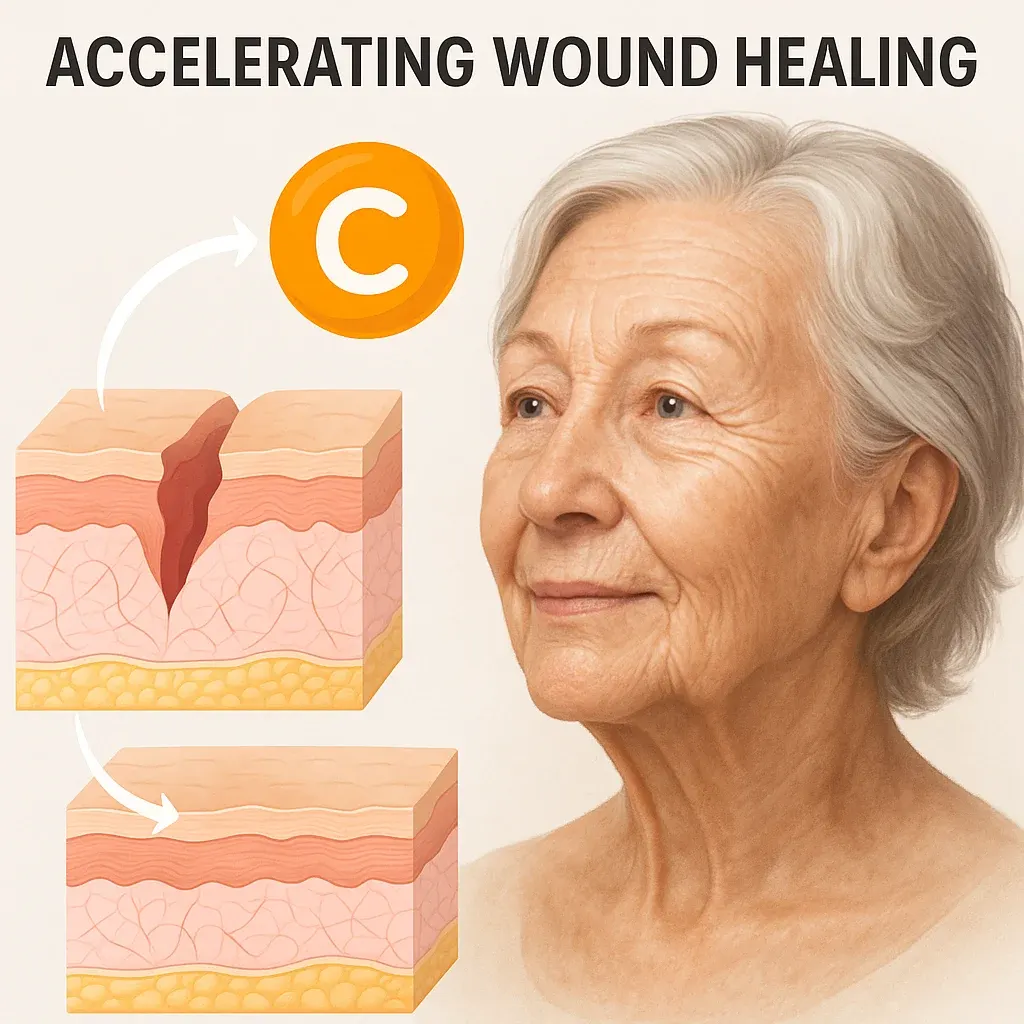
Best Practices for Using Vitamin C for Aging Skin
Choosing the Right Formulation
- L-Ascorbic Acid: The most potent and fast-acting form, best for women wanting dramatic results.
- Tetrahexyldecyl Ascorbate: A stable, oil-soluble form ideal for dry, sensitive, aging skin.
- Sodium Ascorbyl Phosphate: A gentler form suitable for those prone to redness or irritation.
Optimal Concentration
- Start with 10%-15% if you are new to Vitamin C.
- Work up to 20% concentration for maximum anti-aging benefits if your skin tolerates it well.
Application Tips
- Morning Routine: Apply vitamin C serum after cleansing and before moisturizer and sunscreen.
- Layering Carefully: Avoid combining with strong acids or retinol in the same routine to prevent irritation.
- Consistency is Key: Daily use leads to cumulative results over time.
Complementary Ingredients in Vitamin C
- Vitamin E and Ferulic Acid:These antioxidants stabilize Vitamin C and amplify its effectiveness.
- Hyaluronic Acid: Provides deep hydration and plumps the skin, making Vitamin C even more effective.
- Niacinamide: Brightens skin and strengthens the moisture barrier but should be used cautiously or in separate routines if irritation occurs.
- Peptides: Work synergistically with Vitamin C to further boost collagen production and skin repair.
Lifestyle Habits to Maximize Results
- A Diet Rich in Vitamin C: Eating citrus fruits, bell peppers, strawberries, and leafy greens helps internal collagen production and skin repair.
- Avoid Smoking: Smoking depletes vitamin C levels and drastically accelerates skin aging.
- Regular Sunscreen Use: Pairing vitamin C with broad-spectrum SPF is crucial for shielding the skin from UV damage.
- Adequate Sleep and Stress Management: Chronic stress and lack of sleep release cortisol, a hormone that breaks down collagen.
Common Mistakes to Avoid
- Skipping Sunscreen: Even the best vitamin C serum can’t replace sunscreen. Always protect your skin during the day.
- Using Expired or Oxidized Products: Vitamin C degrades easily. Discolored, brown, or separated serums are ineffective and potentially irritating.
- Over-Exfoliating: Aggressive exfoliation combined with vitamin C can thin and weaken aging skin. Balance is vital.
- Not Moisturizing After Application: Mature skin requires ample moisture. Follow Vitamin C with a rich, hydrating cream to lock in benefits.
Addressing Specific Aging Concerns with Vitamin C
- For Wrinkles: Focus on high-potency L-ascorbic acid serums combined with peptides and retinol (used separately).
- For Sagging Skin: Incorporate vitamin C with microcurrent therapy or collagen-boosting treatments for enhanced lifting effects.
- For Dark Spots: Vitamin C serums enriched with niacinamide or licorice root extract can dramatically even out pigmentation.
- For Sensitive Skin: Use gentle vitamin C derivatives like magnesium ascorbyl phosphate to avoid triggering further irritation.
Conclusion
Aging gracefully doesn’t mean surrendering to dull, sagging skin. With its remarkable ability to rebuild collagen, brighten the complexion, restore elasticity, and shield against environmental damage, Vitamin C is a true ally for women navigating the challenges of mature skin.
When used thoughtfully alongside healthy lifestyle choices, Vitamin C can turn back the clock, empowering women to maintain radiant, resilient, and youthful skin at every stage of life.

